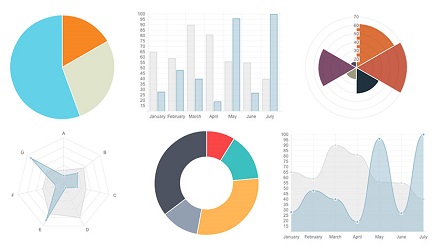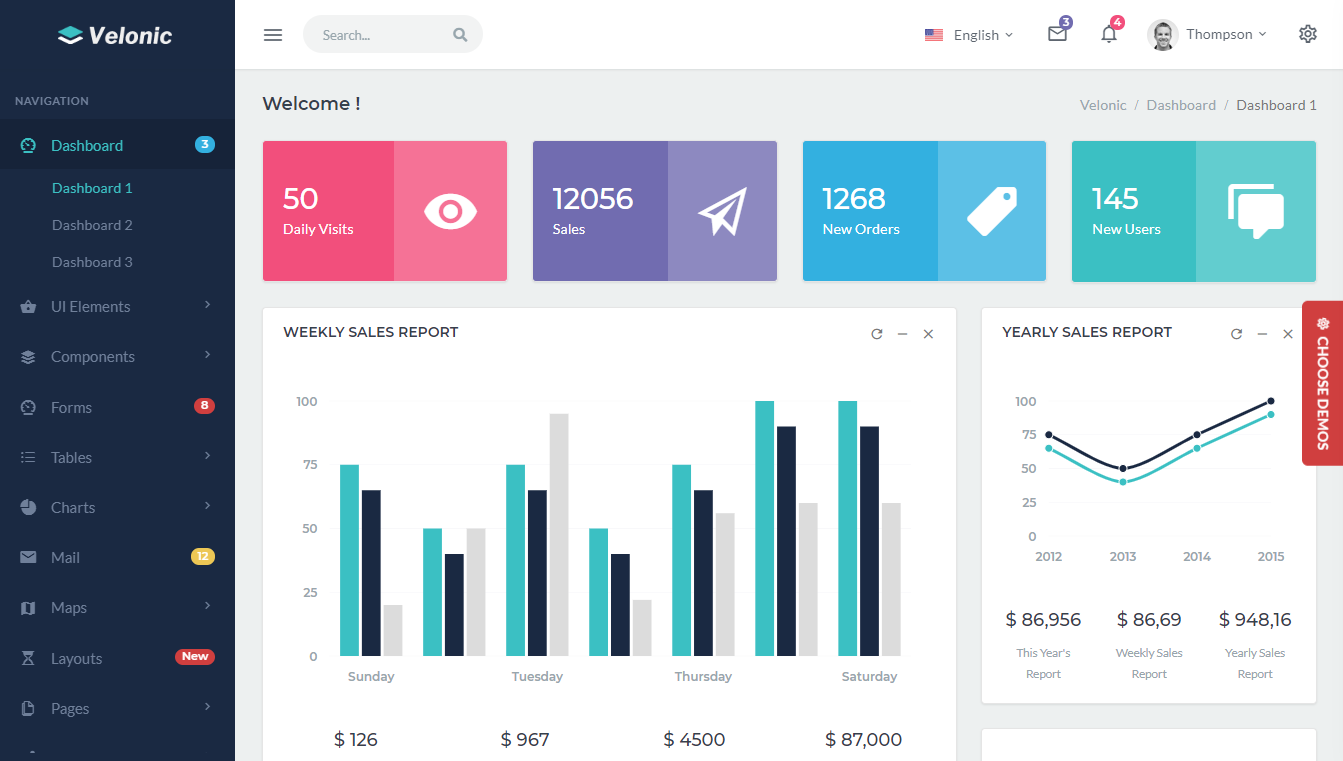Một số dạng biểu đồ cơ bản với thư viện Chart.js và Html
Chia sẻ
Thật dễ dàng để tạo ra một số biểu đồ đơn giản cho web với thư viện Chart.js và Html
1. HTML
<!-- <script src="https://www.chartjs.org/dist/2.9.3/Chart.min.js"></script> -->
<!-- <script src="https://www.chartjs.org/samples/latest/utils.js"></script> -->
<!-- <link rel="stylesheet" href="https://maxcdn.bootstrapcdn.com/bootstrap/4.0.0/css/bootstrap.min.css" integrity="sha384-Gn5384xqQ1aoWXA+058RXPxPg6fy4IWvTNh0E263XmFcJlSAwiGgFAW/dAiS6JXm" crossorigin="anonymous"> -->
<div class="row" id="body">
<div class="col">
<div style="width:50%;">
<canvas id="bar-chart" width="600" height="450"></canvas>
</div>
</div>
<div class="col">
<div style="width:50%;">
<canvas id="line-chart" width="600" height="450"></canvas>
</div>
</div>
<div class="w-100"></div>
<div class="col">
<div style="width:50%;">
<canvas id="pie-chart" width="600" height="450"></canvas>
</div>
</div>
<div class="col">
<div style="width:50%;">
<canvas id="radar-chart" width="600" height="600"></canvas>
</div>
</div>
<div class="w-100"></div>
<div class="col">
<div style="width:50%;">
<canvas id="doughnut-chart" width="600" height="450"></canvas>
</div>
</div>
<div class="col">
<div style="width:50%;">
<canvas id="bar-chart-grouped" width="600" height="450"></canvas>
</div>
</div>
</div>2. CSS
canvas {
-moz-user-select: none;
-webkit-user-select: none;
-ms-user-select: none;
}
#body{
margin-right: -300px;
margin-left: 20px;
}3. JAVASCRIPT
//bar-chart
new Chart(document.getElementById("bar-chart"), {
type: 'bar',
data: {
labels: ["Africa", "Asia", "Europe", "Latin America", "North America"],
datasets: [
{
label: "Population (millions)",
backgroundColor: ["#3e95cd", "#8e5ea2","#3cba9f","#e8c3b9","#c45850"],
data: [2478,5267,734,784,433]
}
]
},
options: {
legend: { display: false },
title: {
display: true,
text: 'Predicted world population (millions) in 2050'
}
}
});
//End bar-chart
//Line-chart
new Chart(document.getElementById("line-chart"), {
type: 'line',
data: {
labels: [1500,1600,1700,1750,1800,1850,1900,1950,1999,2050],
datasets: [{
data: [86,114,106,106,107,111,133,221,783,2478],
label: "Africa",
borderColor: "#3e95cd",
fill: false
}, {
data: [282,350,411,502,635,809,947,1402,3700,5267],
label: "Asia",
borderColor: "#8e5ea2",
fill: false
}, {
data: [168,170,178,190,203,276,408,547,675,734],
label: "Europe",
borderColor: "#3cba9f",
fill: false
}, {
data: [40,20,10,16,24,38,74,167,508,784],
label: "Latin America",
borderColor: "#e8c3b9",
fill: false
}, {
data: [6,3,2,2,7,26,82,172,312,433],
label: "North America",
borderColor: "#c45850",
fill: false
}
]
},
options: {
title: {
display: true,
text: 'World population per region (in millions)'
}
}
});
//End line-chart
//Pie-chart
new Chart(document.getElementById("pie-chart"), {
type: 'pie',
data: {
labels: ["Africa", "Asia", "Europe", "Latin America", "North America"],
datasets: [{
label: "Population (millions)",
backgroundColor: ["#3e95cd", "#8e5ea2","#3cba9f","#e8c3b9","#c45850"],
data: [2478,5267,734,784,433]
}]
},
options: {
title: {
display: true,
text: 'Predicted world population (millions) in 2050'
}
}
});
//End Pie-chart
//Radar-chart
new Chart(document.getElementById("radar-chart"), {
type: 'radar',
data: {
labels: ["Africa", "Asia", "Europe", "Latin America", "North America"],
datasets: [
{
label: "1950",
fill: true,
backgroundColor: "rgba(179,181,198,0.2)",
borderColor: "rgba(179,181,198,1)",
pointBorderColor: "#fff",
pointBackgroundColor: "rgba(179,181,198,1)",
data: [8.77,55.61,21.69,6.62,6.82]
}, {
label: "2050",
fill: true,
backgroundColor: "rgba(255,99,132,0.2)",
borderColor: "rgba(255,99,132,1)",
pointBorderColor: "#fff",
pointBackgroundColor: "rgba(255,99,132,1)",
pointBorderColor: "#fff",
data: [25.48,54.16,7.61,8.06,4.45]
}
]
},
options: {
title: {
display: true,
text: 'Distribution in % of world population'
}
}
});
//End Radar-chart
//Doughnut-chart
new Chart(document.getElementById("doughnut-chart"), {
type: 'doughnut',
data: {
labels: ["Africa", "Asia", "Europe", "Latin America", "North America"],
datasets: [
{
label: "Population (millions)",
backgroundColor: ["#3e95cd", "#8e5ea2","#3cba9f","#e8c3b9","#c45850"],
data: [2478,5267,734,784,433]
}
]
},
options: {
title: {
display: true,
text: 'Predicted world population (millions) in 2050'
}
}
});
//End doughnut-chart
//Bar-chart-grouped-chart
new Chart(document.getElementById("bar-chart-grouped"), {
type: 'bar',
data: {
labels: ["1900", "1950", "1999", "2050"],
datasets: [
{
label: "Africa",
backgroundColor: "#3e95cd",
data: [133,221,783,2478]
}, {
label: "Europe",
backgroundColor: "#8e5ea2",
data: [408,547,675,734]
}
]
},
options: {
title: {
display: true,
text: 'Population growth (millions)'
}
}
});
//End bar-chart-grouped-chartMong bài viết giúp ích được các bạn phần nào trong thiết kế Web. Hãy nhấn nút Chia sẻđể mọi người cùng học hỏi kiến thức mới nhé. Cảm ơn các bạn đã quan tâm Forum.













